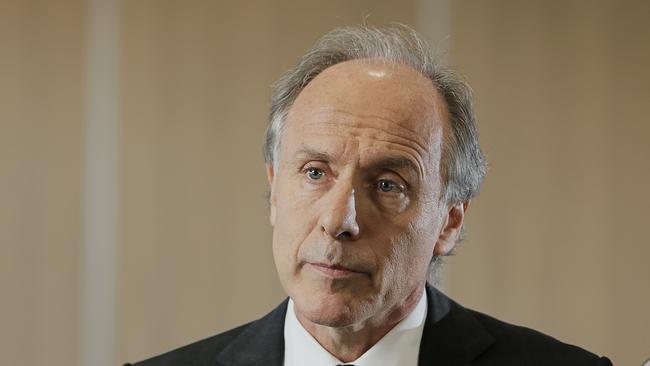Government delays first part of $550m energy plan, stating uncertainties over Finkel review
THE State Government has delayed the first part of its $550 million energy plan, blaming it on uncertainty about whether Chief Scientist Alan Finkel’s recommendations will be adopted.
SA News
Don't miss out on the headlines from SA News. Followed categories will be added to My News.
- Alan Finkel presents landmark energy review
- The Finkel report in layman’s terms
- AGL hikes power prices by 18 per cent
- Government unveils $550 million power plan
THE State Government has delayed the first part of its $550 million energy plan, blaming it on uncertainty about whether Chief Scientist Alan Finkel’s recommendations will be adopted.
Energy Minister Tom Koutsantonis has caved in to industry calls to delay the introduction of a state energy security target, pushing it back from July 1 to the start of next year.
The Energy Users Association of Australia had “significant concerns” the policy would drive up power bills and do little to increase grid reliability.
The target creates an incentive for gas and renewable energy generators to reach a set level of generation each year.
Mr Koutsantonis said the delay would allow the energy industry to “better understand the implications” of Dr Finkel’s recommendation to introduce a Clean Energy Target.
That recommendation was released yesterday as part of Dr Finkel’s Blueprint for the Future Security of the National Electricity Market.

Mr Koutsantonis denied it was a step backwards, emphasising that the State Government had always promised to “fold” the energy security target into a national scheme if one was introduced.
If adopted by government and passed by Parliament, the Finkel blueprint’s 50 recommendations would deliver cheaper power for South Australians — but the state would have to get through next summer first.
Dr Finkel said Australia was at a “critical turning point”. If things don’t change, he said, energy will be more expensive and more unreliable. But under his plan, the system would go through an “orderly transition” into a modern grid with 10 per cent cheaper power; for consumers that could translate to $90 a year.
The blueprint warns that this summer, with increasing heatwaves and bushfires, there is a potential supply shortfall in SA. Meanwhile, electricity prices are going up.
But eventually the new national strategy would put “downward pressure” on prices, making electricity cheaper than it would be under a “business as usual” scenario.
In the blueprint:
A CET is “hesitantly” recommended ahead of an Emissions Trading Scheme because it will be cheaper and easier to implement.
THE CET will replace the Renewable Energy Target by 2020. By 2030, 42 per cent of energy generation will be from renewable sources, more than double current levels.
LARGE generators will have to give three years’ notice before exiting the market and power generators will have to meet security and reliability obligations.
The review was sparked by SA’s statewide blackout last year.
Under a CET, retailers have to source a proportion of their energy from low-emissions sources — but the threshold for a source to be considered “low emission” has not yet been set.
“The lower the emissions … the bigger the incentive,” Dr Finkel said.
“A wind farm coming in would earn a full certificate for being below the threshold. A high-quality gas generator coming in would probably earn half a certificate.
“Coal might not earn a certificate but there is no specific prohibition of any kind that prevents coal (power stations) from being built.”
Energy Minister Josh Frydenberg said it was a blueprint for a “once-in-a-century transformation”.
“The report is focused on four key outcomes: increased security, future reliability, making sure consumers are better off and meeting our international targets,” he said.
Premier Jay Weatherill said the strategy would create certainty and integrate climate change policy and energy policy.
Labor has given the plan in-principle support, but is waiting on more details. The Greens say it is too weak. SA Senator Nick Xenophon said it was a “useful long-term plan… but (it) doesn’t provide a solution to the short-term crisis,” he said.
Energy ministers will deliver their responses to the recommendations in August.


